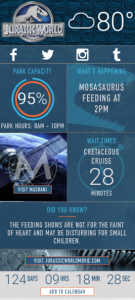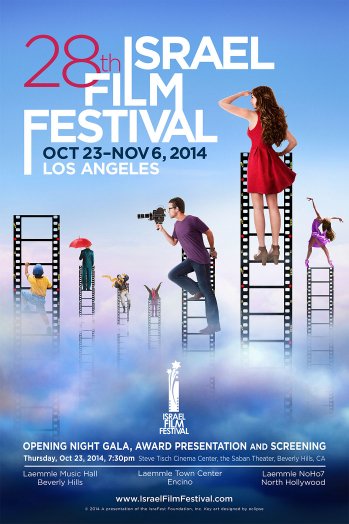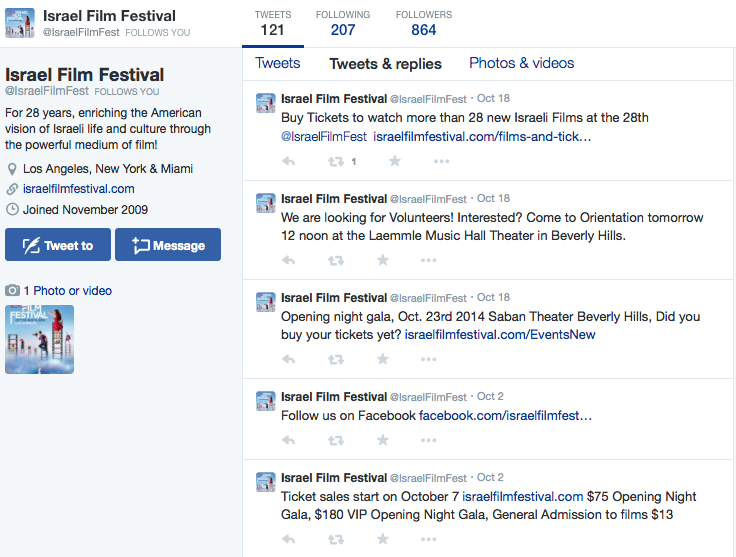Posts tagged film

Jurassic World: The Transmedia Story Begins
1If you watched the Super Bowl, you probably already saw the ad for Jurassic World, the next sure-to-be-a-blockbuster summer movie in a franchise that continues to ask the question, “if we rebuilt the park AGAIN…would it still be a disaster?” and adds the question, “if we created an even deadlier dinosaur than a T-Rex…would that create a safe theme park environment?” While I’m guessing the answer are “yes” and “no,” respectively, from the minute I hear the John Williams score, I’m on board.
But if you’re on the electrified paddock fence about contributing your movie ticket’s cost to creating a blockbuster, Jurassic World wants you: you might not be interested in another dino-disaster flick, but could they interest you in a relaxing trip to the Hilton Isla Nublar, to enjoy the family attractions of their theme park?
Of course, Isla Nublar isn’t a real place. But that hasn’t stopped Jurassic World from launching the story of the film – which isn’t out for another 4 months – through an impressively-detailed website that mimics the life and offerings of a real-life theme park. The site features restaurant menus at the park’s dining establishments, educational materials about the dinosaurs that visitors will encounter, and “live-cam” footage from the park. If you’re really looking for it can you find the link, in tiny print, that says “visit jurassicworldmovie.com.” And if you try to “book” one of their packages – which come in Standard, Family, Adrenaline, Romance and others, each built-out and better-programmed than some conferences I’ve been to – you will get re-routed to Fandango. Otherwise, you can go about your business fantasizing about your luxurious fake-cation.
Jurassic World is creating its narrative’s world through transmedia – creating content across multiple media, in support of a story that will exist or already does exist somewhere else (at least that’s my layperson’s explanation; see here for something “more official“).
Transmedia extends the story and enables more personalized access to the narrative than a one-directional film aimed at an audience in a darkened theater could, and expands the reach of that story using different tools in the storytelling toolkit. Whether it’s webisodes that tell you more about minor characters or deepen historical backstory for a TV show or a peek inside the diary or blog of a character who’s always depicted as scribbling in a notebook, transmedia is a reward for fans who want to know more and a tool to deepen their relationship to the show. It’s like backchannel chatter among those in the know. Sharing information can be a powerful thing that builds trust and investment, creating a proud cohort of evangelists who can represent your brand even when you’re on your lunch break.
It’s become trendy to talk about “storytelling” when it comes to branding. But the word “story” itself doesn’t mean what it classically used to. Now there’s the all-access story, the story-behind-the-story, the context for the story, the story-after-the-story.
The JurassicWorld.com website may still not convince you to see Jurassic World, the movie. But if it convinces you of one thing, let it persuade you to accept that people are learning to expect a narrative that is dynamic, expanding beyond its initially perceived limits. And the most successful brands and organizations will spend the time, creativity and money to build out the universe around the main story in a way that supports their core message, whether it’s donations or dinosaurs.

Social Media Case Study: Unsolicited Advice for the Israel Film Festival
0When I lived in New York, one of the focal points of my entertainment year was the Israel Film Festival. My friends and I, pre-Hulu, pre-Netflix, pre-much-of-anything-other-than-mainstream-modes-of-entertainment, eagerly anticipated the annual display of Jewiness-on-film meets Zionism, the Jewish geography and Hebrew immersion experience that was the Festival. We all knew when the Festival was happening, where it was happening and what was playing. I remember that most of the shows were sold out well in advance, because of the collective New York Israel-loving-and-missing community, many of us in our twenties. We planned outings, doing dinner or drinks first at a local bar or on several occasions, sinking into New York cliche with frozen hot chocolate at Serendipity, which had the convenience of being nearby the theater.
And all of that was before social media.
Since I moved to LA, I’ve either been out of town for the IFF (my fault, but usually because I’m in Israel), or have been in town but have been unaware that it’s happening. This doesn’t seem possible, as I spend most of the day online and connected to the Jewish world. I follow the IFF on Twitter, and subscribe to their FB page, as well as email blasts from the Jewish Journal and the IAC. This year, one of my friends posted about it on Facebook. But if not for that, I might have woken up someday next week and learned that I had missed it yet again.
Theoretically, in this age of hyper-connectivity, I should have been overwhelmed with communications regarding the IFF, both in advance and once it was underway. So why wasn’t I? Part of the problem is that communications are overwhelming generally – since I rarely pick up a copy of the Jewish Journal and read only selected articles online, it’s not the mainstream media that’s the problem as much as it is the evolving way we consume that information. And it might be, in part, because their social media presence is so minimal and they are failing to mobilize the audience (and their sponsors) as brand ambassadors and PR agents.
Because Facebook is an inexplicable mystery when it comes to assessing the potential for organic reach without advertising (and because they should be advertising to LA Jews and don’t seem to be), let’s take a look at the Twitter account for @israelfilmfest.
Their account, since November 2009, has tweeted 121 times. They have under 1000 followers. Most of the “people” they’re “following” on Twitter aren’t people at all: they’re other Film Festivals (who are not likely to share, retweet or publicize the IFF’s efforts) and organizations (some partners, who should be sharing/retweeting/publicizing, but don’t seem to be). And – most disturbingly – only have tweeted 5 times in the month of October, precisely when tweets should have been, if not fast and furious, then laden with information, tempting offers and tidbits about the festival’s films. The website links to a few pieces about the Festival, but imagine the reach of those pieces expanded by social media…
This advice is unsolicited. But because I love the Festival, I’m sharing some tips about how to do it better next year (or at the other two outings of the festival, upcoming in Miami and New York….but don’t ask me when those are or were, since that info doesn’t seem to be on the IFF website).
1. Use your assets in promoting the festival. The filmmakers. The content of their work. Their actors. People in LA who are Israeli or support Israeli culture. Local kosher/Israeli establishments. Festival partners. Organizations who aren’t financial sponsors, but could be content partners. And the organizers should have shot wide in terms of the angles that could be explored for coverage. For instance:
- People who are in the know about Israeli music get giddy at the fact that Meir Fenigstein founded and runs the Festival, it’s like being in the same room with one of the Beatles. Why isn’t there an article about Poogy/Kaveret, or about the music of Israeli films?
- Fenigstein told a story at the screening of “The Go-Go Boys” about Menahem Golan’s role in suggesting and sponsoring the first IFF. Why wasn’t that a first-person piece (or an interview) in the Jewish Journal, Variety, THR, The Writer’s Guild, the Academy of Motion Picture Arts & Sciences, or EW?
- Cannon Films, the Golan/Globus production company that became huge in the 80s and is the focus of The Go-Go Boys,” producing Death Wish, Bloodsport & Breakin’, must have inspired dozens of filmmakers (in addition to Eli Roth, who is featured in the film). Maybe pitch Quentin Tarantino on writing something about his favorite Cannon Films outing, or invite Eli Roth to introduce the film at the Festival? (They may have, but these are the types of ideas I mea when I say “shooting wide…” in regard to PR.)
2. Enhance your social media presence. Ideally, hire someone (or designate a web-savvy volunteer) to coordinate a multi prong social media approach, including (at minimum) Facebook, Twitter & Instagram. But I know sometimes Jewish nonprofits can’t allocate those funds, in which case less ideal but still a plan, hire a consultant to create a plan for you to implement before during and after the festival. And that’s #3…
3. Create a content plan, including a commitment to Tweeting regularly leading up to and during the festival. In addition to varying the types of content posted (trivia, Q&A about the festival or its films, short video clips, shoutouts to filmmakers, links to purchase etc), this content plan should also clearly identify the goals of each week’s social media outreach. Which week will be primarily about promotion and identifying potential partners/sponsors? Which week will be about getting people in the seats? Which week will be about celebrating the people who come and the energy on-site? (That there are NO PHOTOS on the Photos tab on the website as of November 2 – a week into the festival with almost a week to go – is not a good sign.)
Keeping Twitter current and active on its own (or even using magical Facbeook advertising) isn’t necessarily going to sell out the festival. But today, there are so many (free or mostly free) tools that are available – why not use them?
(If the folks at the IFF want help with this next year, they can feel free to be in touch. I’ll give them a decent rate, I promise. :))
Want more posts like this one? Consider joining my new mailing list. No spam, no overwhelming emails, just the occasional conversation starter/act of self-promotion. 🙂 Sign up here…
November and December: Idol Chatterin’
0When it comes to the intersection between pop culture and spirituality (which sometimes means Judaism, specifically), my posts at Idol Chatter on Beliefnet run the gamut: from TV to music, from books to movies, from the Holocaust to the Family Guy to ABBA. Seriously.
After my making a case in October for Don Draper being a vampire, November brought a slew of varied stories. Ian McKellen started ripping pages out of hotel Bibles, Comedy Central expanded to Abu Dhabi, and that “Family Guy” live special offended lots of people. Reading and watching movies about Anne Frank – and presenting on Jewish pop culture at a local high school – led to both reviews and contemplations of what constitutes teen theology. The Macaroons, a new kids’ band, brought catchy rock hooks to Jewish subjects, just in time for Hanukkah.
In December, ABBA was named to the list of future inductees for the Rock-and-Roll Hall of Fame, leading people to say, “um, is ABBA really rock?” But forget Swedish pop music and senatorial musical submissions: what’s new with Jewish music this Hanukkah? The NY Times did a short piece, but I had a few suggestions of my own. Also, in the wake of Orrin Hatch’s musical Hanukkah present to the Jews, Conan’s Jewish cast member – Max Weinberg – sang back with a Christmas song for Mormons set to “I Have a Little Dreidel.” Meantime, those creative folks over at G-dcast created a special animated episode for Hanukkah.
And just yesterday, Roy Disney died, reminding everyone how much of an impact Disney has had on the cultural landscape.


